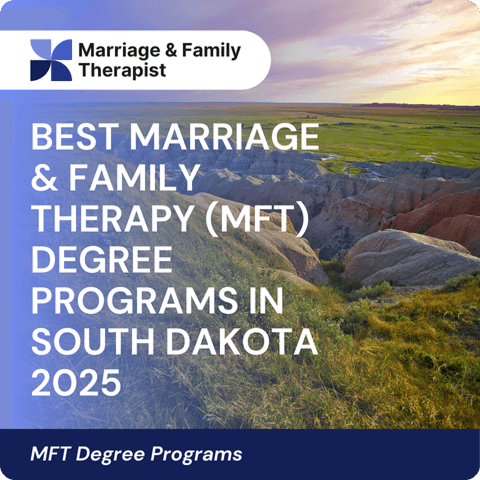Marriage & Family Therapy (MFT) Degree Programs in South Dakota 2025
South Dakota has limited in-state options for COAMFTE-accredited Marriage and Family Therapy (MFT) programs, but students can still pursue regionally accredited counseling programs that align with licensure requirements. With a growing demand for mental health professionals, especially in rural and underserved communities, LMFTs play a vital role in expanding family and relationship therapy services across the state.
In this guide
2026 Best Marriage & Family Therapy (MFT) Programs in South Dakota
Kairos University
Sioux Falls, SD - Private 4-year - kairos.edu
Graduate Certificate - Master of Arts in Marriage and Family Therapy
Online Learning - Visit Website
Kairos University's online Master of Arts in Marriage and Family Therapy uniquely blends psychology with theology, making it the first COAMFTE-accredited online program accessible across North America. It features synchronous live video courses and localized clinical practicums, allowing students to gain hands-on therapy experience while studying flexibly at their own pace. This faith-informed approach, rooted in North American Baptist traditions, prepares graduates for licensure by developing compassionate counseling skills without requiring an entrance exam, emphasizing real-world application through its innovative self-paced model.
- First accredited online MFT program
- COAMFTE accredited nationwide
- Synchronous live video courses
- Psychology and theology integration
- Localized clinical practicum experiences
- Self-paced learning model
- Launch date: Fall semester
- North America-wide accessibility
MFT Programs Available in South Dakota
While South Dakota does not have a COAMFTE-accredited MFT program, students who want to pursue LMFT licensure can still enroll in regionally accredited programs with an MFT specialization or COAMFTE-accredited online programs. These programs provide the necessary coursework and supervised clinical training required for licensure in South Dakota.
South Dakota State University (SDSU) offers a regionally accredited Master of Science in Counseling and Human Resource Development with a specialization in Marriage and Family Counseling, providing students with the educational foundation needed to become licensed marriage and family therapists (LMFTs) in South Dakota. This 60-credit hour program is designed to meet the requirements set by the South Dakota Board of Counselor Examiners, ensuring that graduates are well-prepared for licensure upon completing supervised clinical experience and passing the required examinations.
Students in this program receive comprehensive training in family systems theory, relationship counseling, trauma-informed care, and mental health assessment. The curriculum emphasizes both theoretical knowledge and practical application, with students gaining hands-on experience through internships in hospitals, private practices, community organizations, and social service agencies. Many SDSU graduates go on to work in private practice, clinics, social service agencies, and faith-based organizations, making a positive impact on individuals, couples, and families.
This program is ideal for students who are inquisitive, analytical thinkers, and have a strong desire to help others. With an emphasis on effective communication, problem-solving, and clinical decision-making skills, SDSU’s Marriage and Family Counseling specialization prepares students for diverse career paths in mental health therapy, family counseling, and community-based interventions.
What to Consider When Becoming an MFT in South Dakota
- Choosing the Right Educational Path – Since there are no in-state COAMFTE-accredited programs, students should enroll in an accredited online or out-of-state program that meets South Dakota’s licensing board requirements.
- Supervised Clinical Experience – Most programs require students to complete internships and supervised clinical hours, which can be arranged in hospitals, private practices, and mental health clinics across South Dakota.
- Meeting Licensure Requirements – After completing an MFT program, students must pass the National MFT Exam and apply for licensure through the South Dakota Board of Examiners for Counselors and Marriage and Family Therapists.
South Dakota’s Quickest MFT Programs
Since South Dakota does not have COAMFTE-accredited in-state programs, students must carefully select out-of-state or online programs that offer structured, fast-track options to licensure.
Ways to Complete an MFT Degree Faster
- Choose an Accelerated Online MFT Program: Some COAMFTE-accredited online programs allow students to complete their master’s degree in as little as 20–24 months.
- Enroll in a Full-Time Program: Many out-of-state and online programs allow students to complete their master’s degree in 2–2.5 years with intensive coursework and early clinical training.
- Gain Supervised Experience While Completing Coursework: Some programs offer students the ability to begin clinical hours in their second year, reducing the time required to obtain licensure.
- Transfer Eligible Graduate Credits: Students with prior coursework in psychology, counseling, or social work may be able to transfer credits and shorten their program length.
- Look for Dual Licensure Programs: Some MFT programs also prepare students for dual licensure in mental health counseling, expanding their career opportunities.
For students looking to become licensed LMFTs as quickly as possible, selecting an accelerated program with full-time study and early clinical placements is the most efficient option. Check out our full guide on fast MFT options here.
South Dakota’s Cheapest MFT Programs
Earning an MFT degree in South Dakota can be affordable with careful planning, even without in-state COAMFTE-accredited programs. Students can explore tuition assistance programs, scholarships, and financial aid opportunities to help reduce costs.
Ways to Make an MFT Degree More Affordable
- Consider COAMFTE-Accredited Online Programs: Many online universities offer lower tuition rates than out-of-state public or private universities.
- Apply for State & Federal Grants and Scholarships: South Dakota offers tuition assistance programs for students pursuing degrees in high-demand mental health fields.
- Look for Employer Tuition Reimbursement: Many hospitals, mental health agencies, and school districts offer tuition reimbursement for employees pursuing advanced degrees.
- Use Loan Forgiveness & Repayment Programs: South Dakota provides loan forgiveness incentives for LMFTs working in rural or underserved areas, helping graduates offset tuition costs.
- Work While Studying: Many online and hybrid MFT programs offer flexible scheduling, allowing students to continue working while earning their degree.
For students prioritizing affordability, exploring state-funded tuition assistance, employer tuition reimbursement, and loan repayment programs can make MFT education more accessible and cost-effective.
How to Become Licensed as an LMFT in South Dakota
1. Earn a Master’s or Doctorate in Marriage and Family Therapy
- Enroll in an out-of-state or online COAMFTE-accredited MFT program that meets South Dakota’s licensure standards.
- Ensure coursework covers family therapy theories, ethics, clinical assessment, and trauma-informed care.
2. Complete 3,000 Hours of Supervised Clinical Experience
- Gain post-graduate clinical hours, including 1,500 hours of direct client contact under a licensed MFT supervisor.
- Work in approved therapy settings, such as mental health clinics, private practices, or school counseling programs.
3. Pass the National MFT Examination
- Take and pass the Association of Marital and Family Therapy Regulatory Boards (AMFTRB) National MFT Exam.
- Demonstrate competency in therapy interventions, ethical decision-making, and family counseling techniques.
4. Apply for Licensure Through the South Dakota Board of Examiners for Counselors and Marriage and Family Therapists
- Submit official transcripts, proof of supervised clinical hours, and passing exam scores for licensure approval.
- Complete any state-specific licensing requirements, including background checks and continuing education requirements.
5. Maintain Licensure with Continuing Education
- Complete 40 continuing education (CE) hours every two years, including coursework in ethics, trauma-informed care, and specialized clinical techniques.
- Participate in professional workshops, conferences, and online training programs to stay updated on best practices in family therapy.
Following these steps ensures a smooth transition from student to licensed LMFT, qualifying professionals to work in private practice, behavioral health agencies, and telehealth programs.
LMFT Career & Salary Outlook in South Dakota
South Dakota’s mental health workforce is expanding, with increasing opportunities for Marriage and Family Therapists (LMFTs) to work in private practice, behavioral health agencies, hospitals, and telehealth services. The demand for licensed therapists is particularly high in rural and underserved areas, where access to mental health care is limited.
LMFT Job Demand in South Dakota
- High Need for Therapists in Rural Areas – South Dakota faces a shortage of mental health professionals, especially in rural communities, where LMFTs can play a key role in improving access to behavioral health services.
- Growing Statewide Mental Health Initiatives – The state has increased funding for community-based mental health programs, expanding career opportunities for LMFTs in nonprofit organizations and government-funded agencies.
- Increased Use of Teletherapy Services – With rising demand for remote therapy services, many LMFTs in South Dakota are turning to telehealth platforms to provide counseling to clients across the state.
- Collaboration with Healthcare Providers – Many LMFTs work in hospitals, primary care clinics, and integrated health settings, providing therapy alongside psychiatrists, social workers, and medical professionals.
LMFT Salary in South Dakota
- Average Salary: $58,100 per year
- Entry-Level Salary: $46,000 per year
- Experienced LMFT Salary: $85,000+ per year
- Highest Paying Cities: Sioux Falls, Rapid City, Aberdeen
- Primary Work Environments: Private practice, hospitals, outpatient mental health centers, school-based counseling programs, and teletherapy
Loan Forgiveness & Financial Incentives for LMFTs
- South Dakota State Loan Repayment Program (SLRP) – Offers loan repayment assistance to LMFTs who commit to working in rural or high-need areas.
- National Health Service Corps (NHSC) Loan Repayment Program – Provides student loan forgiveness to LMFTs working in approved mental health shortage areas.
- Employer-Sponsored Tuition Reimbursement – Many hospitals and behavioral health agencies in South Dakota offer tuition assistance or loan repayment programs for therapists employed in their facilities.
With competitive salaries, financial incentives, and increasing demand for licensed therapists, South Dakota offers strong career opportunities for LMFTs, particularly for those willing to work in rural mental health settings or telehealth services.


Related Articles
- LMFT vs MFT: Is Licensure Necessary for Your Therapy Career?
- Who Will You Treat as a Marriage & Family Therapist? A Career Guide for Aspiring MFTs
- Support That Affirms: Navigating Mental Health as LGBTQ+
- MFT Doctorate Degrees: DMFT vs PhD – Who Should Pursue Each Path?
- From Student to Therapist: What to Expect in Your MFT Clinical Internship
- The ROI of an MFT Degree: Analyzing the Financial Investment in Your Therapy Career